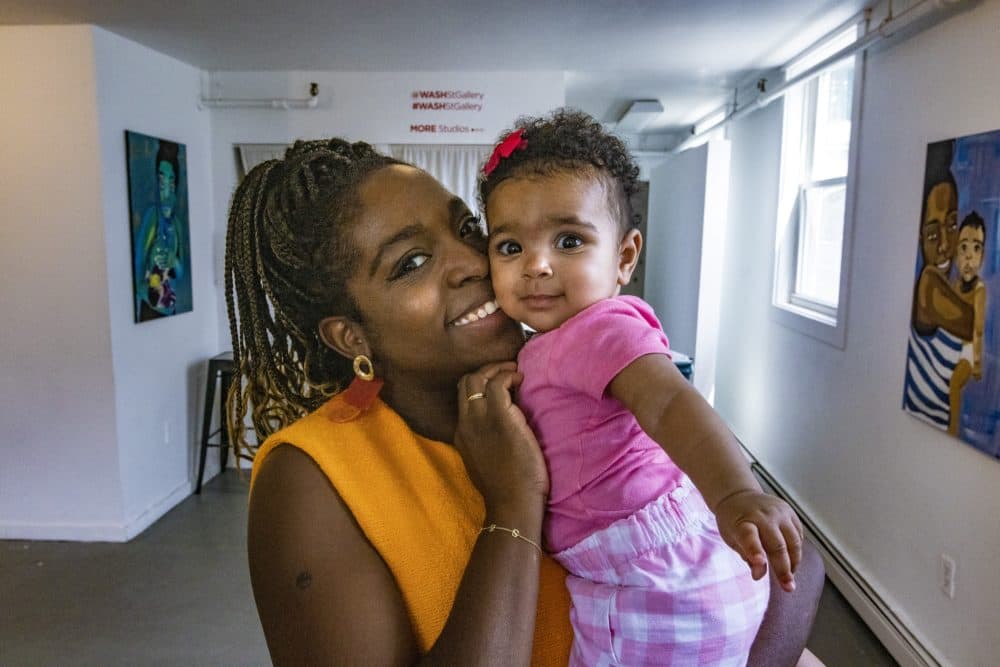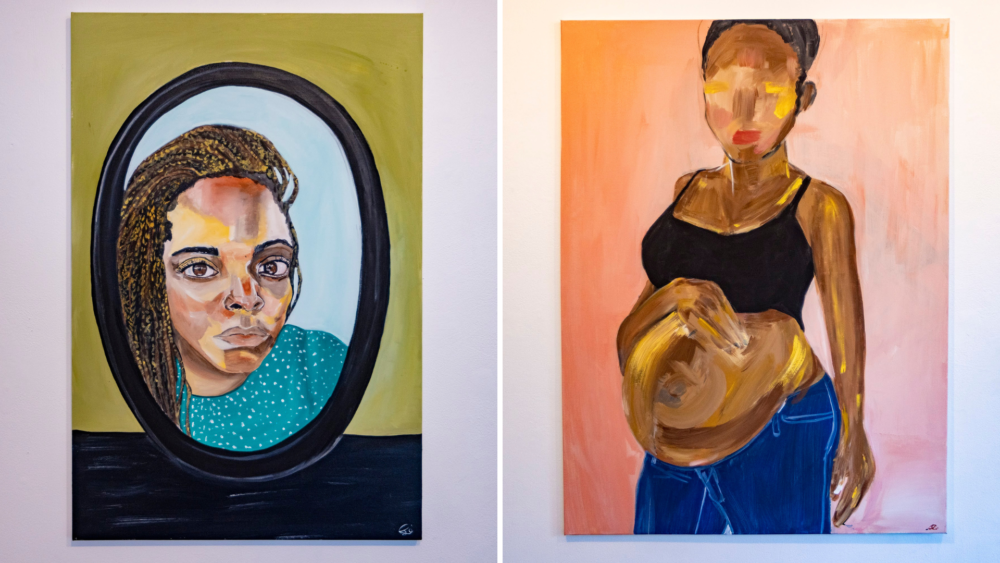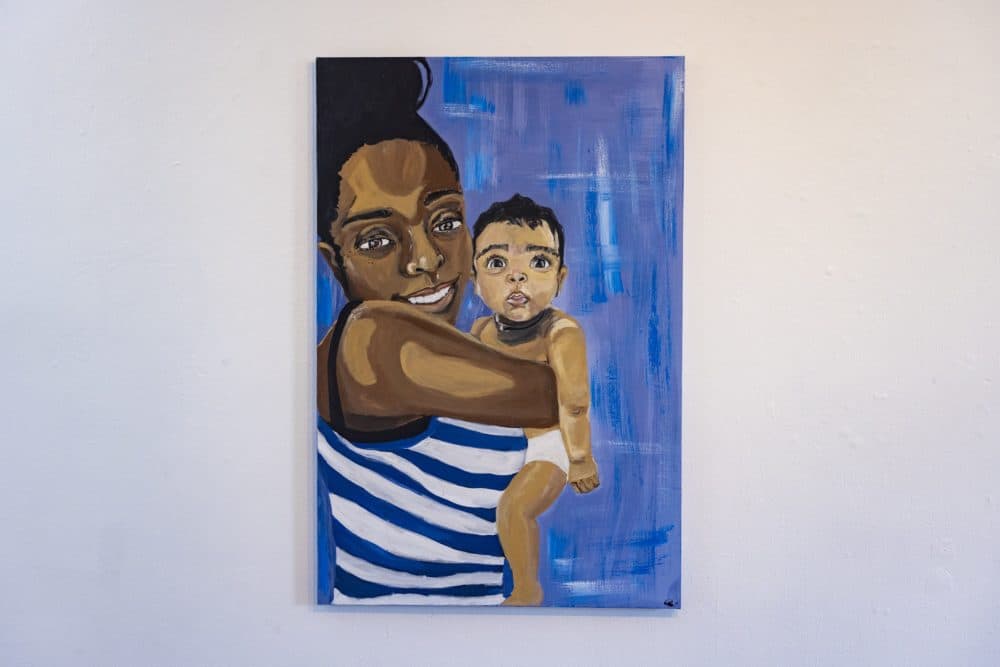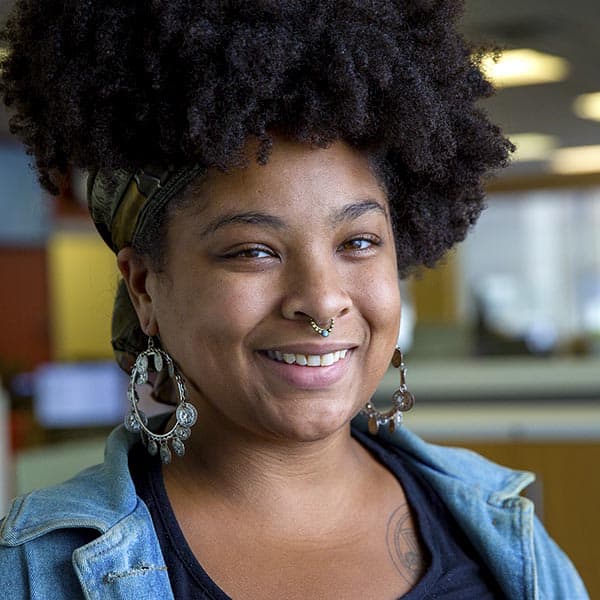Advertisement
In 'The Road to Zoe,' an artist documents her journey from miscarriage to pregnancy

When Valerie Imparato found out she was pregnant in July of 2020, she was a day away from flying overseas to Europe. "I bought a bunch of pregnancy books," she says. "I was so excited, it was great." She and her husband, who is Italian, made it safely to Italy to visit his family. It was there Imparato found out, weeks later, that she had an early miscarriage. Her new exhibit “The Road to Zoe” at Washington Street Art's Gallery 321 in Somerville documents her journey from that moment — the moment she found out she was no longer pregnant -- to the birth of her daughter, Zoe.
“It was very difficult for me,” Imparato, who is an artist and lawyer, recalls of her 2020 miscarriage. Not only was the Somerville-based creative in a different country with a language barrier, she was also without her close family and friends. When she did seek medical care for her miscarriage, she ran into roadblocks many Black people face when seeking maternal healthcare. “Italy is a wonderful and beautiful place, but it does have its racism issues,” she says. “It's already hard enough for Black women in the medical system but those experiences made it worse.”
After spending time processing her miscarriage in a “dark room under a blanket,” Imparato felt like she needed to archive her experiences in some way. Her first mini-series “I was pregnant, and now I’m not” is a “reflection of what I was like for weeks,” she says. “I just wanted to be a shell, I wanted to be alone.”
Mixed-media triptychs showcase Imparato’s actual ultrasounds, embroidered with thread. “I didn't know what my uterus looked like,” she admits. “I feel like many people don’t until they get an ultrasound.” The black and white photos show the progression of her early pregnancy, which she lovingly dubbed her “little bean,” to her empty womb weeks later. She says that the triptych in particular speaks to the highly medical portions of miscarriage. “It’s not like you just miscarry and that’s it. Doctors took thousands of pictures of my uterus, there were all kinds of tests and imaging that happened.”

In the months after her miscarriage, Imparato battled with myriad conflicting emotions about her body and motherhood. “I was angry at my own body, it felt like it failed me in some way.” Ongoing stigma and misinformation surrounding miscarriage can make women feel as though it’s their fault when a pregnancy doesn’t make it to full term, Imparato says. Comments from well-meaning people after her miscarriage emphasized some of those feelings for her. “What's hard about early miscarriage is it feels invalidating because you never had the belly, you never were publicly pregnant,” she points out. “And it was like this thing that was really intimate, that is between you and this undefined being, it's just gone.”
While much of “The Road to Zoe” grapples with the loss and despair and even body dysmorphia that comes with miscarriage, it also documents the (somewhat tenuous) joy that she felt when she found out she was pregnant again in 2021. In her piece “Am I glowing yet?,” Imparato peers solemnly into a mirror, not yet hopeful and almost skeptical as she endures what’s known as the “two-week wait.” “Essentially, it’s the time it takes from when you have intercourse to when you can really take a test and confirm you’re pregnant,” Imparato says. “It’s literally hell, it's purgatory.”

But after those two weeks, Imparato confirmed that she was indeed pregnant. The rest of the exhibit are portraits that reflect that process, from her early pregnancy to a more abstract rendering called “The Container," where she boasts a heavily pregnant belly but her face is blurred beyond recognition. “Being pregnant is hard,” she admits with a laugh. “As amazing as being pregnant was, it was like the first step of disappearing, as myself. I felt like I was just this interchangeable vessel.”
In a post-Roe world, pregnancy and motherhood have become battlefields for religious and political debates. But that doesn’t change the fact that the choice to bear a child is an extremely personal one. In some cases, giving birth can be deadly, as Imparato found out when she finally gave birth to her daughter. “I almost died,” she says. “It was traumatic, I had hemorrhaging and liver and kidney failure.” And for Black people who are pregnant, higher rates of preeclampsia and other medical conditions can make the entire process precarious. “I chose this,” Imparato continues. “For me, to think that anyone could be forced into this really intense and potentially dangerous process is scary.”

"The Road to Zoe" not only documents Imparato and her daughter’s growth, it reflects an expansion in her artistic practice. “Most of my other work has been made with the idea that I was going to show it at some point and has been made to portray a message,” she says. “But this was and has been and is for me. I was doing it just to kind of survive this time in my life.”
Though the “Road to Zoe” has been a long one, Imparato can’t think of any other place she’d rather be. The last piece in the exhibit titled “You and me” perfectly encapsulates the feeling. In it, Imparato holds a wide-eyed Zoe, both gazes turned directly at the viewer. “It's based on a photo. And in it, she's almost looking like she can't believe that we're here, like she can't believe we've made it this far,” Imparato says. “And in that moment, I felt so grateful that we are here. That we really made it.”
Valerie Imparato's exhibition "The Road to Zoe" is on view at Washington Street Art's Gallery 321 through Aug. 13.
